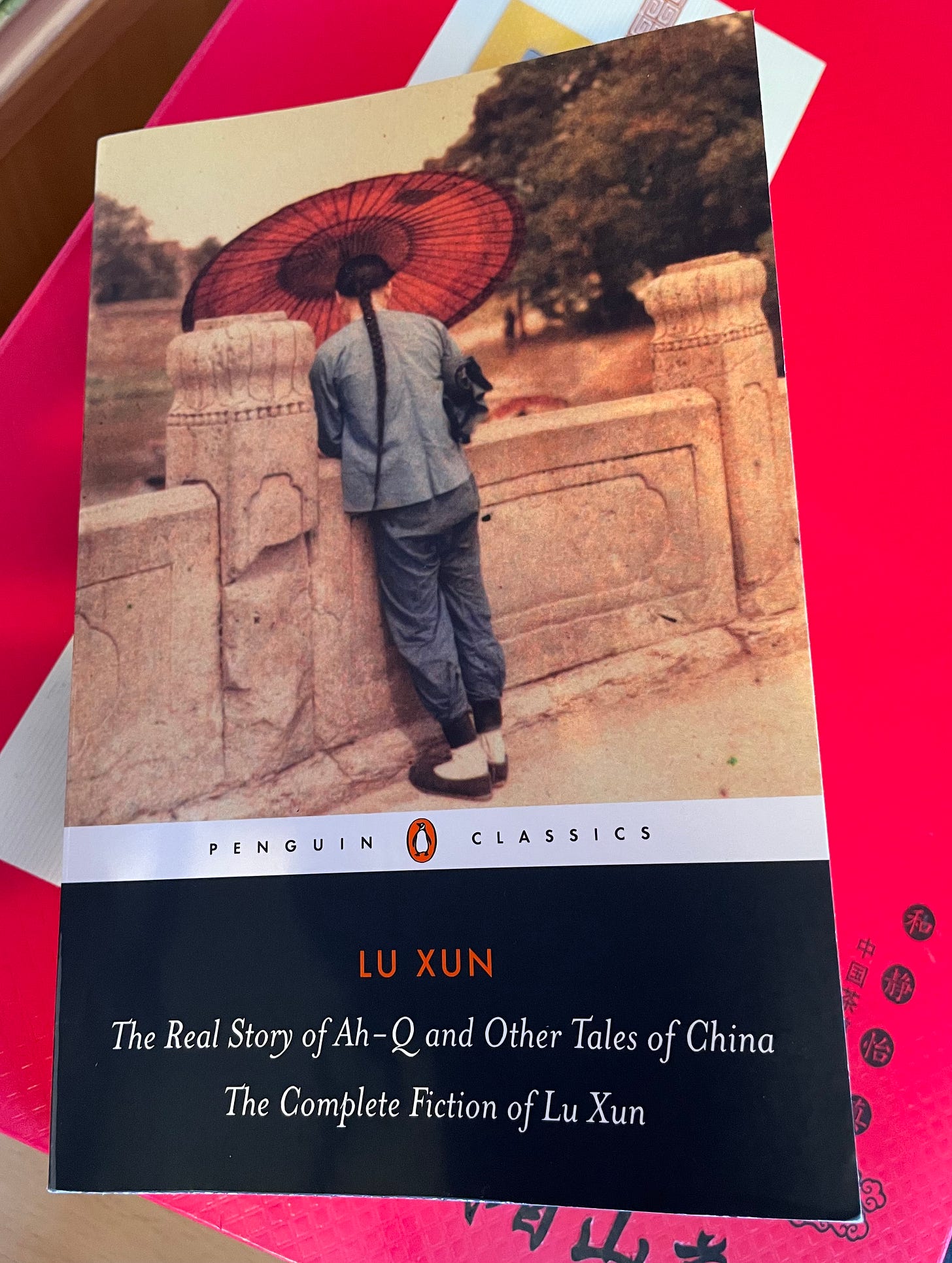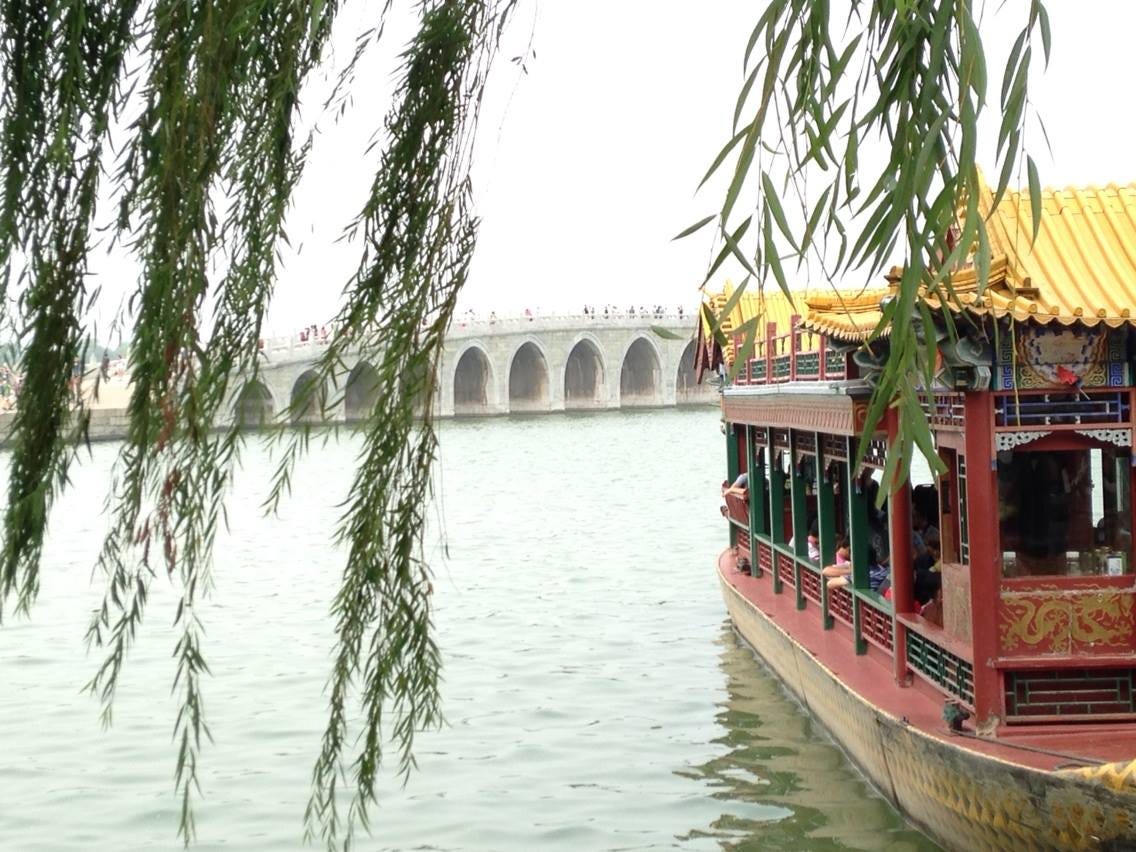OVER THE GREAT WALL
Behold a primer on all that led to the shaping of contemporary China. The stories by Lu Xun throw open a window to the language, the culture, and the great civilization.
“However rude a nation was in physical health, if its people were intellectually feeble, they would never become anything other than cannon fodder or gawping spectators, their loss to the world through illness no cause for regret. The first task was to change their spirit; and literature and the arts, I decided at the time, were the best means to this end. And so I reinvented myself as a crusader for cultural reform.”
~~~ Lu Xun, in the preface to The Real Story of Ah-Q and Other Tales of China: The Complete Fiction of Lu Xun

When I began reading this week’s Chinese collection of short stories by Lu Xun (translated by Julia Lovell), I was reminded of the late Dhumketu’s body of work, and struck by how they were contemporaries. Several weeks ago I wrote about Dhumketu, whose short story collection was published last year by Deep Vellum in the United States.
Born just eleven years after Lu Xun in 1892, Dhumketu was blessed with more longevity; he died at 73 years of age whereas Lu Xun succumbed to an attack of asthma at 55 years. Both were prolific and influenced also by their reading of Western writers. Lu Xun produced many translations of Western works, significant critical essays, and poetry. His complete collected works fill twenty volumes. Likewise, Dhumketu published over 500 short stories spanning across twenty-four volumes, besides which he authored historical novels, social novels, numerous plays, travelogues, essays, literary criticism, and memoirs. In the last century, if the world had been like it is today—one in which luminaries from different parts of the globe engaged in regular conversations and successfully volleyed ideas over the great wall that we once called a language barrier—what sorts of artistic collaborations and inspirations might we have seen?
I bought Lu Xun’s collection of stories from a shelf at Kinokuniya when I lived in Singapore for six months during the height of Covid-19. While I managed to catch up on quite a lot of reading on Southeast Asia during my stay in Singapore, I didn’t actively begin reading books in translation until later.
On Monday, I finally fished out The Real Story of Ah-Q and Other Tales of China: The Complete Fiction of Lu Xun suspecting that I may not be able to zip through all the stories in the collection. It’s impossible to do justice to such a collection in a week, especially when the stories often reference several points in China’s history. While reading the stories, I constantly found myself making detours, trying to understand the references to historical revolutions and cultural mores. I always needed a little more context to something that I’d just read so that I could dredge out the import of a story. Inside Lu Xun’s 400-paged paperback collection, I found yet another pleasant distraction—an afterword from Yiyun Li, a writer whose writing has moved me over the years even though I’ve always wished she’d sprinkle her writing with at least a handful of adjectives and adverbs.
Considered China's greatest modern writer of the 20th century, Lu Xun was known for spearheading the transition of literature from classical Chinese to vernacular Chinese. Yiyun Li notes that she grew up on a fund of Lu Xun’s stories and was first introduced to his words at six years of age. As a twelve-year-old, when she read the original story titled My Old Home, Li was disturbed: “The glimpse of a bleakness lurking in every man’s life, which I did not understand at the time, kept me listless for weeks and months afterwards.”
I felt that melancholy, too, when I read the story. The experience of alighting upon Charles Lamb’s heartbreaking poem The Old Familiar Faces (in college in 1980) rushed back into my head when I read My Old Home. It tells the story of a man who goes back to his hometown after twenty years. As a child, he had had a friend called Runtu who became a fixture in his adolescence.
“I looked forward every day to New Year, for New Year would bring Runtu. At last, when the end of the year came, one day mother told me that Runtu had come, and I flew to see him. He was standing in the kitchen. He had a round, crimson face and wore a small felt cap on his head and a gleaming silver necklet round his neck, showing that his father doted on him and, fearing he might die, had made a pledge with the gods and buddhas, using the necklet as a talisman. He was very shy, and I was the only person he was not afraid of. When there was no one else there, he would talk with me, so in a few hours we were fast friends.“
When he enters his boyhood home decades later, his mother informs him that Runtu, once a friend who fed his imagination and was his partner in crime, was waiting to see him. When the narrator finally connects with Runtu, he realizes that their link has been forever been severed, right under their noses.
In the time that has passed between the two of them, their stories have diverged dramatically. Now, Runtu looks up to him and refers to him as “Sir”. The narrator is as accomplished and wealthy as Runtu is unvarnished and poor. The weight of that loss of innocence is palpable, in both men. Between them is a grating reminder—of what was once true and pure—of something that had been sullied by the passage of time and the hand of destiny. The narrator also notices how the children of both the men connect right away, just as he and Runtu once had connected. How could we trap that joy and innocence, that untainted enjoyment of one another’s company—without being marred by class and status? Was it even possible?

One of the oft-referenced stories by Lu Xun is The Real Story Of Ah-Q. In an episodic piece ricocheting with the zaniest slapstick moments, the author narrates the story of a peasant who doesn’t know who—or what—he is. People use him however they wish.
“Ah-Q had no home of his own: in Weizhuang, he lodged in the Temple of the God of the Earth and the God of the Five Grains. Neither, as the village odd-job man, did he have a fixed profession. If someone was needed to harvest wheat, he harvested wheat; if called upon to husk rice, he husked rice; if a boat wanted poling, that’s what he did.”
Ah-Q epitomizes spinelessness in human beings. The implications are clear. Those who lack conviction, agency and a sense of self will be swallowed by the system. By and by, we begin to realize that Ah-Q represents the people, especially those who lived in the time of the 1911 Xinhai revolution in China (that ended China's last imperial dynasty and led to the establishment of the Republic of China).
I wondered if the name “Ah-Q” was a deliberate choice on the part of the author. In a discussion of the story, one blogger claims that 'Ah' represents a prefix for calling someone in Chinese, and that 'Q' reflects the imagery, the actual symbol, of the people with queues in Qing dynasty. (This reminded me right away of my story on the Gold Rush in California—don’t miss the image along with the factoid on the heartless chopping off of queues.) It turns out Lu Xun thought a lot about queues for he did indeed go through so many hair phases of his own. Another of his stories—titled Hair—gives voice to the obsession over hair, one that is at once as specific as it is universal.
“I remember my grandmother telling me about those times—about how bad they were. If you let your hair grow, the government soldiers killed you; if you didn’t, the Taipings did. What is hair? Dead protein. But how many Chinese have suffered, or even died because of it?”

I’ve still not finished several stories in this collection but the ones that touched me were those that just presented a moment and let me mull over the changes in the characters. In A Minor Incident, a rickshaw puller teaches his passenger an important lesson on how to be humane; in A Comedy of Ducks, a blind Russian poet Eroshenko helps his host see. By the time the poet leaves Beijing, the host’s home is a Tower of Babel.
“By the time the frogs began their summer chorus, the ducklings were full grown up—two white, two piebald—and their chirps had deepened into quacks. Though the lotus pond was now far too small for them, luckily my brother’s house was built on low-lying ground, and the courtyard flooded the moment the rains fell. And there they spent the summer—splashing, bobbing, flapping, quacking—as happy as could be.“
I found this story enchanting:.A man who was missing one of the five basic senses had shown his host’s family members how to wake up all their senses by making just a couple of changes in their lives.
In The Diary Of A Madman—here’s a valuable class discussion on the story—it’s clear that the madman’s vision is much more grounded in reality than that of anyone else. It’s a story of one man who thinks differently from all the clones around him. A unique specimen like that will always be pilloried; his plea is heartrending, a reminder of how difficult it is to be the lone voice in a .world that always seems to reward groupthink.
“I don’t expect you to fight on my behalf, alone against the rest of them. But do you have to join the conspiracy? They’ll do anything, eat anyone: me, you, each other. Pull back from them, change—and we will all live in peace.”
Yiyun Li’s closing essay points out that while Lu Xun deserved a special place in the Chinese literary canon, several equally accomplished writers were blotted out by his halo. “It was out of ideological necessity that Lu Xun was canonized, his work overshadowing some of the other writers of his era, Shen Congwen and Lin Yutang, for instance—whose work, if not banned was rarely seen in print for decades.” Lu Xun’s reputation remained unsullied during the various political movements in China, even as many fiction writers were criticized or discredited. Mao Zedong, the founder of the People's Republic of China who was also a poet, showered the greatest praise on him, calling Lu Xun "commander of China's cultural revolution."
“Lu Xun’s own family life seems to have been infected by a certain fin-de-siècle art melancholy: the clan compounds scattered with lonely older wives neglected for younger concubines, and lethargic males—Lu Xun’s father included—stifled by failure in the fiercely competitive civil service examinations .”
~~~ From the Introduction to The Real Story of Ah-Q and Other Tales of China





